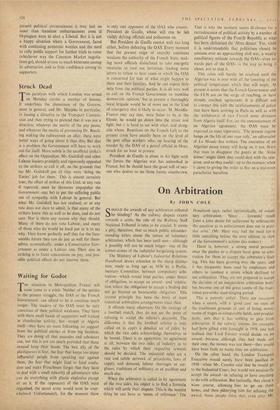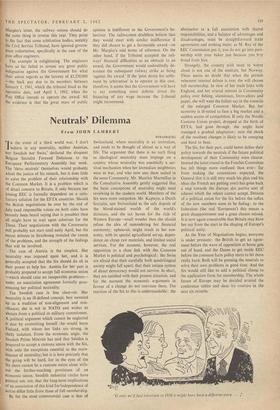On Arbitration
By JOHN COLE SHOULD the awards 'of any arbitration tribunal be binding? As the railway dispute crawls towards a crisis, the role of the Railway Staff National Tribunal is' seen to be crucial. It seems a pity, therefore, that so much public misunder- standing exists about the nature of voluntary arbitration, which has been until now - -although it possibly will not be much longer one of the corner-stones of the industyial bargaining system.
The Ministry of Labour's Industrial Relations Handbook draws attention to the sharp distinc- tion, made as long ago as 1856 by a Parlia- mentary Committee, between compulsory arbi- tration—which would bind parties, under threat of obligation, to accept an award- • and 'arbitra- tion where the obligation to accept a finding did not go beyond an honourable obligation.' This second principle has been the basis of most industrial arbitration ‘arrangements since then.
It offends many observers. On the analogy of a football match, they do not see the point of refusing to accept the referee's decisions. The difference is that the football referee is only called on to apply a detailed set of rules, by which the two sides acknowledge themselves to be bound. There is no agreement. no agreement at all, between the two sides of industry as to the rules by which their respective rewards should be decided. The industrial rules arc a vast and subtle network of precedents, laws of supply and demand, labour shortages or sur- pluses, traditions of militancy .or of pacifism and much else.
When the arbitrator is called in by agreement of the two sides, his object is to find a formula which will settle their dispute. This is the nearest thing he can have to 'terms, of reference.' The 1.1«ndbook says, rather optimistically. of volun- tary arbitration: 'Since . . [awards] result from a joint desire for settlement by arbitration, the question as to enforcement does not in pute- lice arise.' (Mr. Hare may feel the need for a little redrafting before the next edition, in view of the Government's actions this winter.) There is, however, a strong moral pressure once the parties to a dispute have gone to arbi- tration for them to accept the arbitrator's find- ing. This has been growing over the years, and i; has frequently been used by employers and others lo lambast a union which declined to use arbitration. 'They are not prepared to accept the decision of an independent arbitration body' has become one of the great taunts of the tradi- tional pre-strike mud-slinging period.
This is patently unfair. There are occasions when a union. with a 'good case' on most of the traditional grounds of cost of living, move- ments of wages in comparable fields, and produc- tivity, sees that it has nothing to gain from arbitration. if the railway unions, for examples had been gifted with foresight in 1958, and had realised that Lord Forster would decide on no award—because although they had made out their case, the money was not there—they would have been fools to waste time on arbitration.
On the other hand, the London Transport Executive would. surely have been justified in 1958- when Mr. Cousins said that he would go to the Industrial Court, but would not necessarilY accept the award—in refusing to have anything to do with arbitration. But tactically, they chose a wiser course, allowing him to go on these terms, and then pillorying him for refusing the award. Some, people think that. even after Mr. Marples's letter, the railway unions should do the same thing in reverse this year. They point to the fact that some arbitration bodies, notably the Civil Service Tribunal, have ignored govern- ment exhortation, specifically in the case of the post office engineers.
The example is enlightening The engineers have so far failed to arouse any great public indignation against the Government for what their union regards as the larceny of f1,250,000 7–the back pay due to its members between January 1, 1961, which the tribunal fixed as the operative date, and April 1, 1962, when the Post Office intends to operate the award. All the evidence is that the great mass of public opinion is indifferent to the Government's be- haviour. The railwaymen doubtless believe that they would meet with similar indifference if they did chance to get a favourable award—on Mr. Marples's odd terms of reference. On the other hand, if the Tribunal accepted the rail- ways' financial difficulties as an obstacle to an award, the Government would undoubtedly de- nounce the subsequent railway strike as being `against the award.' If the 'joint desire for settle- ment by arbitration' is to operate in this case, therefore, it seems that the Government will have to say something more definite about the financing of any wage increase the Tribunal might recommend.



































 Previous page
Previous page